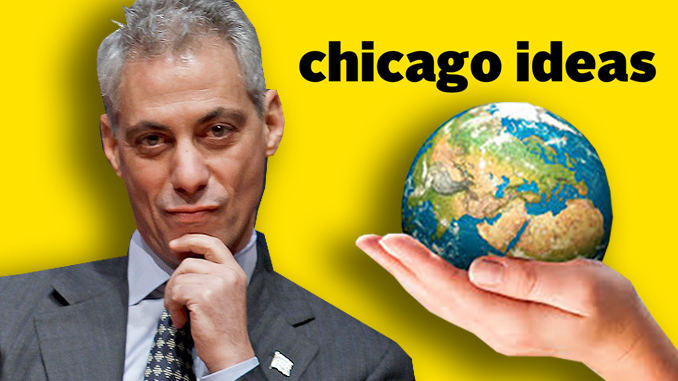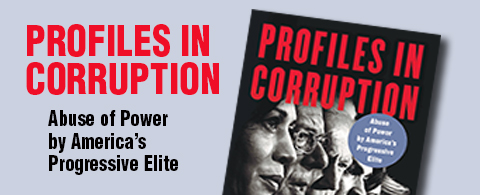
By Mark Anderson
On Feb. 28, former Chicago Mayor Rahm Emanuel addressed the nonprofit organization Chicago Ideas to pump his new book, The Nation City: Why Mayors Are Now Running the World. Thus, the “nation city” has suddenly become a part of the collective “global cities” vernacular.
Take note that Emanuel is not futurizing. He is stumping to make the case that the nation-state is an anachronism against which mayors, joined by some state governors, should rebel in order to usurp and “devolve” national power to the local level. The one-worlders themselves call it “glocalism.”
Three or four years ago, at globalist forums— the annual Pritzker Forum on Global Cities in Chicago, for instance—there were several suggestive statements about localities doing an eventual end-run around the nation-state, but most of the statements were confined to mayors wanting a seat at the table in order to be more seriously consulted about immigration policy, international trade, foreign policy and diplomacy.
The next step-up came in February 2018 when Ivo Daalder, president of the Chicago Council on Global Affairs—which puts on the annual Forum on Global Cities each June—traveled to London’s Chatham House think tank, which is in the same money line as the infamous Council on Foreign Relations. The program that Daalder attended explored the revealing question: Should cities have their own foreign policy?
That same month, then-Mayor Emanuel, who served two terms before his 2019 retirement, helped unveil the “Resilient Chicago” plan—an offshoot of the North American Climate Summit in Chicago held in December 2017. That summit, the first of its kind held by the Global Covenant of Mayors for Climate and Energy—an EU-created entity presided over by former New York mayor and former presidential candidate Michael Bloomberg —produced the Chicago Climate Charter. That pact comports with the ongoing global cities movement.
 In early 2018, Emanuel signed an executive order committing unwitting Chicagoans to the goals of the 2015 Paris Agreement, not only as pushback against President Donald Trump for removing the U.S. from that pact in 2017, but also to accentuate the point that, under the global-cities rubric, the nation-state itself could be bypassed.
In early 2018, Emanuel signed an executive order committing unwitting Chicagoans to the goals of the 2015 Paris Agreement, not only as pushback against President Donald Trump for removing the U.S. from that pact in 2017, but also to accentuate the point that, under the global-cities rubric, the nation-state itself could be bypassed.
In other words, participating mayors need pay no heed to the Constitution’s Article I Section 10: “No state shall enter into any treaty, alliance or confederation . . . [and] no state shall, without the consent of Congress, enter into any agreement or compact with another [U.S.] state, or with a foreign power.
During a Chicago Ideas interview conducted by Ariel Investments CEO Mellody Hobson, Emanuel did not mention that municipalities are creatures of their respective states and therefore would automatically collide with Article I, Section 10 under any city-foreign diplomacy scheme.
“You say the future of society is with mayors and cities,” Ms. Hobson noted. “Yes,” Emanuel replied, adding, “A third of [my] book is about the center of gravity of our politics moving out of Washington, out of Brussels, out of London—to local.”
In his view, national governments are rife with “distance, dysfunction, and disinterest.” From the vantage point of the locals, he said, those gaps should be filled with the “intimate, immediate, and impactful” policies of cities. “Local governments are leading the charge on climate change. Local governments are leading the charge on immigration,” he continued.
Emanuel, who also served as a White House staffer in the Clinton and Obama administrations and as a U.S. congressman, ascending to chief of staff for Obama, added that while the first third of his book is about “political science,” the subject of “urban politics” is a major focus of the rest.
Emanuel spoke proudly of his Jewish upbringing in Chicago, while outlining several ideas for “proper city governance” (improving K-12 schools, better libraries, better mass transit, entertainment events and other aspects of city life).
He feels these things provide “shared experiences,” which function as the glue that prevents diversity from tearing society apart because no one can agree in a multicultural society on the basic tenets of workable governance.
But, while stressing that “diversity becomes a liability if you don’t agree on something”—and noting that 147 languages are spoken in Chicago’s public schools—he took a sharp left turn by saying: “I really think what this country needs right now is national service,” instead of, for starters, that English should be the official language to help simplify communication and promote unity in schools.
Moreover, national service agencies such as AmeriCorps are premised on people serving the government and not the other way around. Emanuel’s municipal ideas do not require a total restructuring of the local-state-federal relationship to be implemented. Ideas some may find appealing can be a wedge into a more illicit end game.
Emanuel does not recognize America’s dominant Christian and European roots that until recently produced social concord. Those of Emanuel’s secularist ilk have for decades instead screamed for separation of church and state. But since the multiculturalism Emanuel supports is not the same thing as assimilation—where moving to America means you become an American in the fullest sense—his chief remedy becomes social engineering in the form of national service, instead of liberty under the law where “men are endowed by their creator with certain unalienable rights.” Therein lies the delicate deception.
Mark Anderson is AFP’s roving editor. Email him at [email protected].


